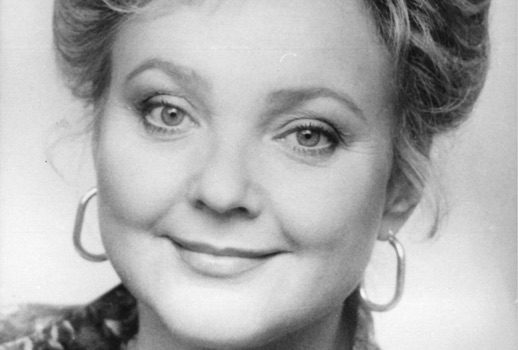
“Ich möchte tanzen noch, und Abschied nehmen von meiner Mädchenzeit.”
While Handel wrote 17 full-length music dramas that begin with A, he’ll have to wait until next month. Richard Strauss wrote just three but the right choice for today’s “Trove Thursday” must be Arabella with Wolfgang Sawallisch conducting a prime-time 1980s Munich cast of Lucia Popp, Wolfgang Brendel, Peter Seiffert, Julie Kaufmann and Marjana Lipovsek. I know this opera is sometimes looked down on as the poor step-sister of Der Rosenkavalier but I love it and sometimes even prefer it to its grander predecessor.
It’s difficult to believe it’s been 24 years since that horrible time when the world lost Popp, Arleen Augér and Tatiana Troyanos all in a five-month period, each just 53 or 54. I heard Troyanos many times and Augér twice but Popp never. I had tickets for her Pamina in Die Zauberflöte on the opening night of Lyric Opera of Chicago’s 1986 season but she canceled as she had done the previous season as Eva. Her final US opera appearances must have been Pamina at the Met in early 1981. I might have caught her in recital at Lincoln Center in the fall of 1991 but somehow I missed it—alas!
Lots of sopranos have graduated from “young” to “mature” roles in the same opera but Popp seems to have done that more often than most. She was a notable Zdenka before taking on her older sister, Sophie then the Marschallin. It occurred even more often in Mozart: Blonchen-Konstanze, Despina-Fiordiligi, Servilia-Vitellia and more. I’m not so convinced by the heavier Wagner roles she undertook later part of her career but Elisabeth on the Bernard Haitink recording of Tannhäuser has many fans. Seiffert, of course, was married to Popp during the final seven years of her life.
I understand that some dislike her; a squeezed, glassy quality sometimes appears but nearly always the charm, the shining vivacity, the wistful beauty of her singing win me over. The very first opera LP I ever owned was highlights from the Klemperer Zauberflöte which likely made me a Popp (and Gundula Janowitz) fan for life.
Brendel’s Met debut at 28 as the Count in a new Nozze di Figaro didn’t attract much attention; he wasn’t on a broadcast and didn’t return for twelve years. I vividly remember seeing a photo of his San Francisco debut as Rodrigo in Don Carlo in the late 1970s—a certified “barihunk” with pornstache long before either term was coined. My first encounter with Brendel in the flesh (so to speak) was as a dashing Onegin at Lyric, the production with Mirella Freni, Peter Dvorsky and Nicolai Ghiaurov which was later telecast.
His eventual return to the Met (where he sang regularly for the next 20 years) was cemented by the premiere of the first Zeffirelli Traviata as he was Carlos Kleiber’s preferred Germont at the time. I was grateful to have attended that performance as it was the only one with Kleiber conducting the announced cast of Edita Gruberová, Neil Shicoff and Brendel—first Shicoff called in sick, then Kleiber decamped!
Brendel’s Mandryka will be familiar from the Met DVD where he courted Kiri Te Kanawa; my recollection is that he was not originally scheduled for those performances but brought in to replace…Bernd Weikl perhaps? He now teaches at Indiana University alongside Teresa Kubiak and Carol Vaness.
R. Strauss: Arabella
Bavarian State Opera
9 January 1985
Arabella: Lucia Popp
Zdenka: Julie Kaufmann
Adelaide: Marjana Lipovsek
Fiakermilli: Ulrike Steinsky
Fortune Teller: Cornelia Wulkopf
Mandryka: Wolfgang Brendel
Matteo: Peter Seiffert
Waldner: Alfred Kuhn
Elemer: Norbert Orth
Conductor: Wolfgang Sawallisch
Concluding a (Janet) baker’s dozen of past “Trove Thursday” treasures:
Last week we had Alfredo Kraus as Cherubini’s Nadir but there’s also the sublime Alain Vanzo as Bizet’s in Les Pêcheurs de Perles.
Cavalli isn’t the only great Italian successor to Monteverdi as a marvelous performance of Il Tito by Antonio Cesti demonstrates.
As Rosa Ponselle did, Renata Scotto prepped for Norma with Spontini’s La Vestale.
Unfortunately the concert’s promoters were unable to provide tickets for Parterre Box to attend José Carreras’s New York farewell tonight at Carnegie Hall, but we can remember his voice in its prime as Nemorino pining for the Adina of Ileana Cotrubas in a 1976 L’Elisir d’Amore.
Arabella, Ali Baba, Adriana and Attila can each be downloaded by clicking on the icon of a square with an arrow pointing downward on the posting’s audio player and the resulting mp3 file will appear in your download directory.
Nearly 100 other “Trove Thursday” podcasts also remain available from iTunes or via any RSS reader.



